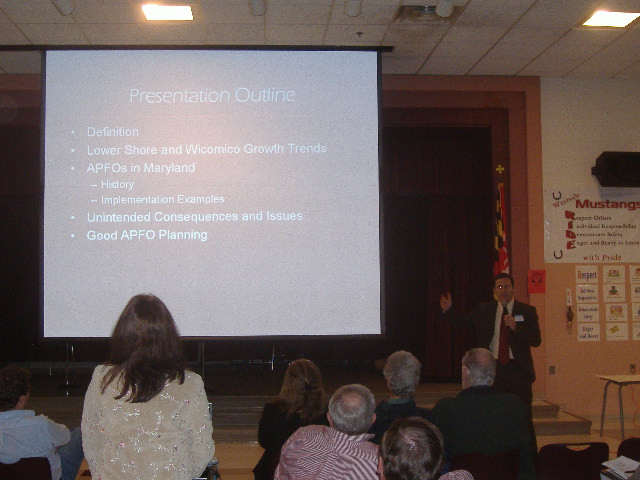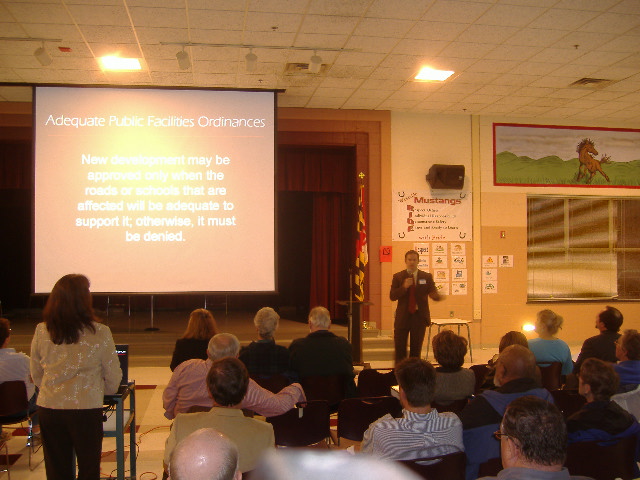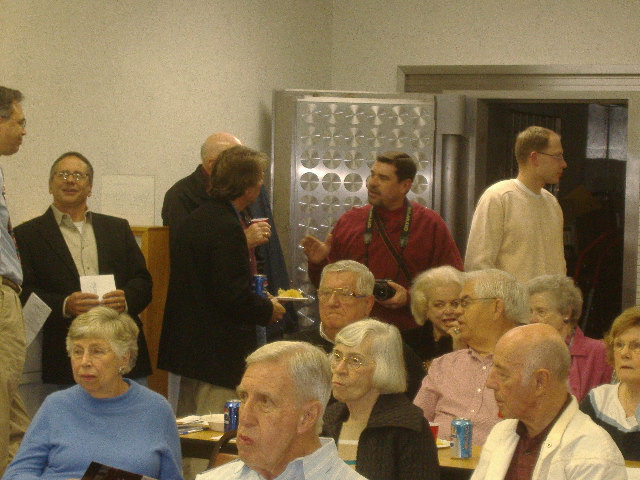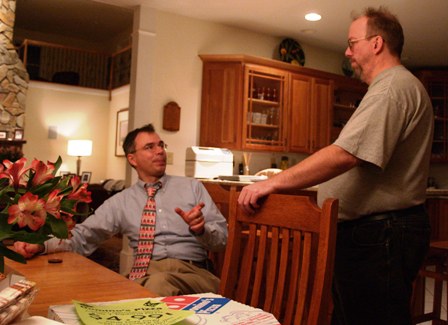Tonight Congressman Wayne Gilchrest culminated a day on the Lower Shore by speaking at Salisbury University. The topic of his talk: “Iraq and Back: Congressman Gilchrest Shares Perspectives on the War in Iraq.” He spoke in front of an overflow crowd in the Worcester Room, which was set up for 120 people.
He broke his address down into three parts – one to give a historical “frame of reference”, another based on events from 2002 to the present and the third his “optimism” about current events.
In his “frame of reference” section, he began by citing author Norman Cousins and his book Human Options. He gave two quotes from Cousins, “Knowledge is the solvent for danger”, and, “History is a vast early warning system.” To me, that’s in the same vein as the famous Edmund Burke statement, “Those who don’t know history are destined to repeat it.” With that same thought, Gilchrest also talked about Robert McNamara’s observation on Vietnam that we didn’t have the benefit of hindsight on the event as we were living through it.
Gilchrest also recalled other instances of Presidents engaging our sworn enemies with dialogue. Eisenhower and Kennedy with the Soviet Union and Nixon with China were examples, while a notable omission was not talking to Ho Chi Minh during that era. In the modern day, the end of the Cold War “fractured the geopolitical balance of power in the Middle East” where the was now no balance of power or center of gravity. In considering this argument, I do have to counter that I would prefer not to have a balance of power as we did with the Soviet Union – being the lone world superpower suits me much better.
Wayne also told the gathering that the war in Iraq is “not a religious war” and that the “U.S. needs to be an objective participant in the healing process.” Also, it was only recently that Iran became more of an enemy; in fact, Gilchrest claimed that the Iranians helped us in subduing the Taliban. Moreover, the Congressman went on to say that Iran and Saudi Arabia were as much enemies of al-Qaeda as we were.
At this point Gilchrest went into a brief history of the buildup to the war. Much of this ground regarding the internal Pentagon battle between the civilians and the military were items he covered in front of the Wicomico County Republican Club back in August, so I’ll refer you to that article.
Since then, he’s made his trip over to the Middle East and the next portion of his speech covered his optimism on the situation now. He noted, “there is al-Qaeda in Iraq but the conflict is about the ‘power brokers’.” “It’s not a civil war,” he continued, but at the moment “the (American) military is the skeletal structure on which Iraqi society depends.”
So what do we do with our forces? Gilchrest told us that the debate was now over, and the drawdown has begun. (He was careful not to use the term “withdrawal.”) In fact, there’s slated to be 30,000 fewer troops there by next June. Gilchrest claimed that much of this was because the Administration was now listening to Secretary of Defense Gates and other who privately assert that the deployment cannot be sustained at the pace it had beein going. But Wayne also cautioned that the Middle East was still “fractured” – the way forward was for the “U.S. to be seen as an objective participant” and not necessarily as a shill for Israeli foreign policy. Slowly we were bringing the Arab world into agreeing with a two-state Israeli/Palestinian solution. In answering a later question after the floor was opened, he alluded to troops being left in Iraq for the purposes of training Iraqi soldiers and security to maintain Iraq’s economic viability.
Returning to the subject of Iran, the Congressman asserted that Arabs did not want an Iran with too much influence and that the U.S. should “open a dialogue” with Iran, claiming they would be a “good trading partner.” In addition, Iran “will probably never” have the capability to deploy nuclear weapons and that WMD’s were “against Islamic law.” In other parts of the world, Ahmadinejad was considered a “clever clown.”
Gilchrest also made a call for “exquisite diplomacy” and cautioned the students in the room that information should be gleaned from varied sources. After all, he joked, no professor would accept a paper whose sole research source was Rush Limbaugh. (But would they accept one solely based on Air America? I bet they would!)
At this juncture the address was opened up to questions. First out of the chute was a question on the Biden three-state proposal. While it “looks good on paper to the U.S. perspective”, he claimed that Iraq was “insulted” by being dictated to as they were by the British and French. He happened to be on the ground in Iraq at the time so he had first-person reaction.
Gilchrest was also asked if there was a media bias on the war. After giving a few of his favorite sources – the BBC, MacNeil/Lehrer, The Economist, New Yorker, and National Public Radio – he advised students to find what they considered their most reliable sources. As a member of Congress, he had to sometimes probe for information rather than just go by talking points.
The Democrats are sitting on war funding, or so a questioner claimed. Gilchrest stated that the defense budget is about $500 billion, with additional money used for the war “off-budget.” But the war will cost “trillions” by the time its over. He did say that he would vote for the $196 billion supplemental and that “no soldier will go without what they need” because of activities in the House. It may be a case of getting the money at something like $50 billion increments, he added. One telling statement Gilchrest made was that he was advising Democrats to stop talking about withdrawal because it was happening anyway.
Someone asked if 9/11 was a government coverup. Gilchrest disagreed, noting his thought was that al-Qaeda started planning the World Trade Center attack the day after their failed 1993 bombing attempt. It was an act by “savage” people who weren’t reflecting the “Abrahamic” tradition of the Middle East.
Injured veterans on both sides were a “tragedy”, Gilchrest responded to a question on that subject. While “mistakes have been made” at Walter Reed and other facilities, the veterans still were under the care of the “best doctors in the country.”
Responding to a question about a survey of Iraqi citizens, Wayne said that no one in Iraq wants an occupation and they want their country back, but conversely Iraqis don’t want withdrawal to be abrupt. It goes back to security until economic viability and stability is attained.
There were then a series of questions about foreign policy that didn’t necessarily speak directly to the conflict in Iraq. A couple statements that I found curious came out of those questions.
One statement is that we can and should talk to “sane” members of al-Qaeda, those who had retreated from the hardline “edge” that most of them continue to occupy. The other, which I thought interesting in the wake of recent foreign policy events in Annapolis, was that the U.S. cannot just “appear” to be objective because the Arabs will see through it. If we’re not honest brokers, the Arabs will turn to Russia or China. In Gilchrest’s terms, Russia “hasn’t found its soul yet” and China is “a cruel place with less freedom than desired.” I agree with those assessments, particularly on China. Wayne also told us that he thought both Israeli and Palestinian children deserved to live with peace.
Turning to a domestic issue, there was curiosity about “peak oil,” a pet issue of fellow Maryland Republican Roscoe Bartlett. Wayne said that he was Congress’s “smartest man” on energy issues and we need a “better energy policy.” Instead we get a “cacophony of chaos” on the House floor. Gilchrest advocated more technological solutions to the problem along with an “economy-wide move to efficiency.” Biofuels “will not do it,” he added. Of course, you know where I stand, and the statistic Gilchrest used about 2/3 of our oil being domestically produced in 1970 vs. about 1/3 now is easily explained to me by the fact that we can’t explore or drill anywhere in the country! Yes, we need to “unleash our ingenuity” but we can use that to make oil exploration and transport better too.
We then had a question about the ATR pledge signed by Gilchrest. However, Gilchrest said that, “I do not sign things” like that, and “I don’t believe I ever voted to raise taxes,” with the caveat of something that may have been a small part of an overall bill. He “generally” has voted to reduce taxes over his career.
Sometimes Gilchrest is called a “liberal.” Wayne said the term depends on context, after all, one example of liberalism to him was Gorbachev freeing the Soviet Union.
And that was how he ended his speech. But he got one more question, from me.
I asked him whether he felt vidicated by the shift in Iraqi policy that has led to the recent drawdown and he quickly answered, “yes.” I continued by inquiring whether he thought Secretary of Defense Gates was a catalyst, and he again affirmed it, noting that Gates has “backbone.” To me it seems like, accidentally or not, events in Iraq are starting to work as he wanted them to in the first place – however, we all should keep in mind that he wasn’t in favor of the surge that seems to have brought about this success and continually voted with Democrats for a withdrawal date.
But if Iraq pretty much ceases to be an issue before the February primary, it appears that largest difference between him and his opponents fades into the background which works to his advantage. It’s been a pretty good last few days for the incumbent, and it becomes a larger challenge for his opponents to overcome Wayne Gilchrest’s advantages.
Crossposted on Red Maryland.








